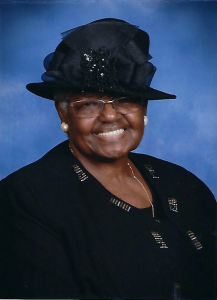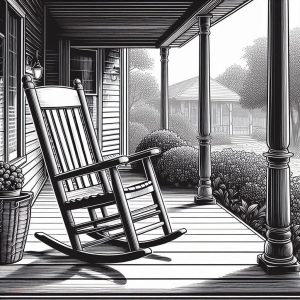By Tom McGowan

I once told a story titled Disappear. It was about people passing away and disappearing from our lives. When I sent it to a friend, it struck him; he said it was elegiac. I’m an engineer, not a man of letters, so I had to ask that English major what that meant. He said elegiac, elegy like. And that was true.
This intro is just an on-ramp to a story about my next-door neighbor. Ethel was 89 years old and was at Grady Hospital and then at A.G. Rhodes Home for rehab, and then back to Grady Hospital, then home then back Grady Hospital again with persistent pneumonia and other grave illnesses. I (and other neighbors, too) helped her and her daughter Debbie cope. When I visited Ethel at Grady one morning, they tested her and found she had low blood sugar. I held her hand and talked to her and she looked at me but didn’t speak. I stayed a while and talked with nurses and gave Debbie updates by phone. I gave Ethel a hug before I left. Later on, when Debbie was there and Ethel had eaten and was able to talk, she said some white guy had been there in a yellow jacket (I had biked there and back…). Debbie said, “That was Tom.” And Ethel kept asking about Tom and Luna, Tom and Luna (Luna is a year-old baby across the street.) Both of us were on her mind that day.
During the last round at Grady, when the end was near, Debbie managed to get hospice set up and take Ethel home. Three days later, Debbie called me at 6:40am to let me know she had passed. I was in Tennessee working on a job. I called my girlfriend Carol and Annelys, who lives across the street, and they went over before the ENTs and the family arrived. Over the next week Debbie made arrangements for the funeral and she asked me if I would say a few words. I mumbled and stuttered around saying that “maybe, maybe I could try.” The problem is simple: since my wife died 11 years ago, I don’t do well at funerals; my emotions are too close to the surface. I knew what I would say, and had been running it through my head. But I’m a storyteller and I know a story should have a beginning, middle, and an end, and this was barely a work in progress. I planned to write it in a letter to give to Debbie to read later.
Carol and I went to the funeral and we lined up outside with the family and friends, giving more than a few of them long, long hugs before we filed in. We were told to sit with the family in the center aisle of the first Iconium Church on Moreland Avenue. We were back about 15 rows — it’s a big family. Ethel had six children, three stepchildren, 50 grandchildren, 29 great-grandchildren, and 36 great-great-grandchildren. Nearly all of them were seated in that broad center aisle. The church’s outer aisles were packed too, with well more than 200 folks there.
The service lasted some three hours. At the end, there was a list of folks that Debbie wanted to come up to say a few words. Carol looked down at the program and there was my name — I was second up at the end. Carol grabbed my right forearm and squeezed and said, “You can do this.” It was something a coach might say when putting in the substitute in the last minute of a game. I got up and walked down the aisle wondering, Could I do this? I stood with my hands gently gripping that little podium with the microphone on it to steady myself. After a pause, I started out with “good morning,” which most of the previous speakers had started with. Good so far. My voice was still able to work, at least to get two words out. And then I said, “In 1977, when I moved into my house on Pavillion Street, I made it a point to visit my neighbors. My next door neighbors were the Copeland family, and that was when I first met Ethel Mae Copeland.”
“We were neighbors for over 40 years, taking care of each other through good times and bad – yes, good times like the 4th of July.” If I could talk more, I would have added: With barbecue, oh yes, the ribs, corn on the cob, potato salads and beans, gallons of iced tea, and a plate to go home with you, too. Family and friends — a real crowd. I continued: “She said I was family, and I told her the same. This is something that you don’t hear often.” I would have added: something that is seldom said, and only said when it is true, and must be said. “Yes, the hugs [two of the preceding speakers went into great detail on the hugs she gave; she was 4½ feet tall, a strong Baptist woman that knew the Lord, and gave big hugs that were not to be rushed; lean in and stay a while]…she taught me how to hug; I had been very poorly trained before.” That did trigger a few laughs. After a pause, I said, “And every one of her hugs lasted me a week. Bless you.”
I walked down the aisle still trying to breathe and suppressed a single racking sob as I sat down and squeezed Carol’s hand. What my words lacked in detail and length was made up for in my emotions. It came from deep within, from the very marrow of my bones. She was a good woman, important to her family, her church, and all the children she taught in school. The world needs more people like her.
Carol and I had to leave for a long drive — we had delayed it by a day for the funeral — and knew that staying to greet so many and attending the interment was not possible. We headed out the door to an empty landing. A woman dashed out of one of the other doors, calling me, “Tom, Tom.” It was Angela, Anita’s granddaughter, who had lived across the street, a part of the extended Copeland family. We had not seen each other in many years. We gave each other a long, long hug. And that hug too lasted me a week.




